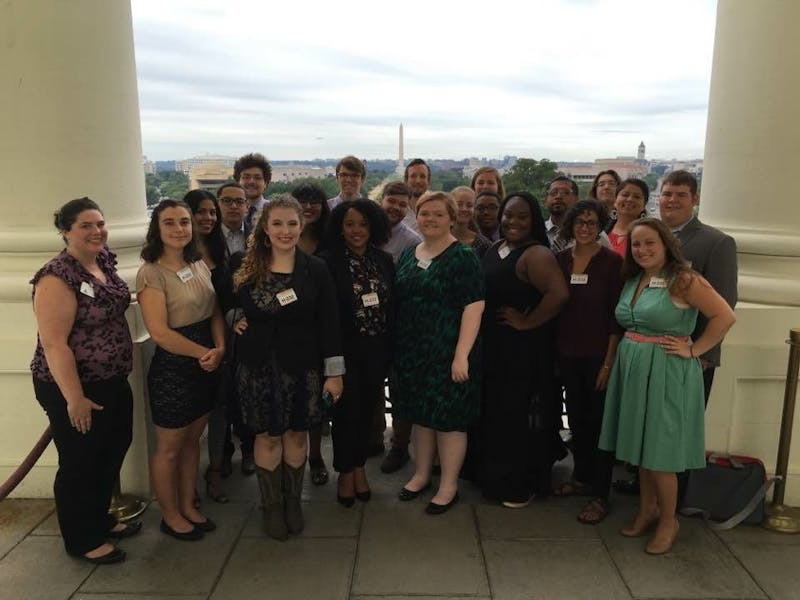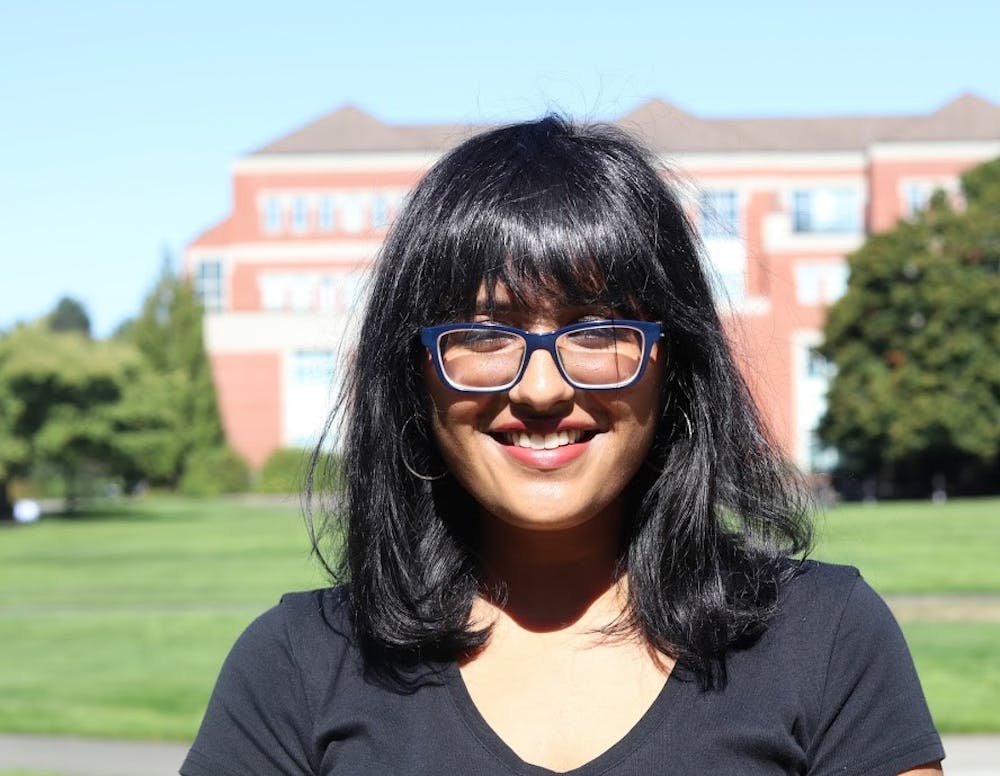Sitara Nath jaunts into the Pilot House, backpack slung over one shoulder, looking like any other University of Portland sophomore.
“I’m not very eloquent,” she says as she sits down, eyeing the recorder on the table.
But the way she tells her story and speaks about her work suggest otherwise.
She talks about a time nearly 10 years ago when she was walking in downtown Olympia, Wash., her hometown, with her father. They were several steps behind a man wearing a military uniform and the obvious glow of one-too-many beers.
“He had been telling his neighbor about how he had just been fighting in Iraq and fighting terrorists,” Nath recalls. “And then he turns around and says, ‘I’ve been fighting people like them.’ I was nine.”
It was, she says, her first encounter with the misperception of immigrants, something she had never even really considered herself to be.
“I remember being really terrified not because I was scared of this man but because I was suddenly very aware that my perception of myself as an American is not what others view me as, they view me as an outsider, an alien.”
She’s not angry about it – at least not outwardly – instead, she’s determined to do something.
Nath spent 10 days this past summer in Washington D.C. with the nonprofit Friends Committee on National Legislation learning and beginning to lobby for immigration reform. The summer experience was only the start of a nine-month internship in which the political science and philosophy major will add “policy change” to her to-do list, alongside her 19 credits and being an active member of the University Honors Program.

Nath, along with 19 other college students working in different regions across the country, are ultimately hoping to see comprehensive, bipartisan immigration reform.
“People talk about ‘securing the border’ and we really want to include border communities in a discussion on how to improve the border situation,” Nath said. “We want to create more humane policies so that people can not only come into this country but also have an easier time seeking opportunity, and we want a comprehensive approach, not just micro policies dealing with some issues at a time but really a full package is the way to go at this point.”
And along the way, she looks forward to telling the stories of people from immigrant backgrounds, like herself.
Nath’s parents came to the United States from Southern India about 25 years ago in order to pursue better educational opportunities and academic freedom. Just weeks before her trip to D.C. this summer, Nath visited the small village in India where her mother’s mother grew up, and it shaped her mindset going into the experience.
“I’ve always been very proud of the fact that I am a first generation American,” Nath says. “And after visiting India, I realized how proud I am to live in this country and have the rights that I do and respect that I do. When I was (in India), I saw that there’s just so much close-mindedness. And it’s so sad that in (America) which is founded on diversity and welcoming and hope … We’re trying to push out people that are trying to gain those same opportunities.”
While in D.C., Nath met with immigration staff members for Oregon’s national representatives, senators Jeff Merkley (D-Or) and Ron Wyden (D-Or), and congressman Earl Blumenauer (D-Or) to tell her story and speak about the issues she sees in the current immigration system.
Additionally, Nath’s group visited the White House and spoke with Obama’s immigration staff and speechwriters to get a feel for what the country’s administration is working towards.
As a young Indian-American woman working in our nation’s capital, which remains largely dominated by older white men, Nath said the meetings often required projecting some false confidence.
“It’s a matter of holding your ground and reminding them that just because I’m the one fighting for this issue, doesn’t mean the opinion is invalid,” Nath said. “There are a lot of microaggressions that occur when a woman is in a political setting. Men, when they’re in a political or office setting, their body language is very confident and very open, and it’s kind of funny but immediately I began feeling of intimidated. It’s a personal thing; I have to make sure I stand my ground. “
Nath was inspired by another young woman from Portland she met working in Merkley’s office and by the other students she worked with Friends Committee on National Legislation, the interfaith, social justice-oriented nonprofit she is working with.
“Young adults, specifically, have a unique voice in Washington … The energy and excitement and expertise that they bring really does lead to concrete policy change,” said Katie Breslin, Advocacy Corps Coordinator for the Friends Committee. “Sitara is fantastic, she’s a very skilled organizer. Students will definitely benefit from her vision, especially on the issue of immigration.”
Sitara will continue these meetings through trips to downtown Portland, Salem and Washington D.C. over the next nine months. And while Nath says it can be intimidating to meet with such prominent potential change-makers, she feels she is making headway.
The goal: To make Oregon’s representatives more aware of the issues facing immigrants and children or grandchildren of immigrants by bringing them on these visits so that they can tell their stories. The internship requires that she bring at least 30 people from the Portland and Oregon areas on lobby visits with her.
Stories are what make us human, she says, so by humanizing people who have been marginalized by violent political rhetoric and immigration policies and allowing them to tell their stories, she hopes government leaders will be inspired to move for policy change.
Her work is ramping up with the presidential election just over a month away. Nath expects that regardless of who is elected, the leadership change will have a stark impact on her work.
“Right now, what we’re really trying to battle is the rhetoric around immigration reform, because once the rhetoric is out there, it influences the culture,” Nath said. “If Clinton gets elected, her staff has promised to come up with an immigration reform plan within the first 100 days ... If Trump is elected it’s going to be, I honestly can’t even imagine.”
Beyond her nine-month project, Sitara’s plans look similar to most other college sophomores’ – murky. For now, she isn’t looking toward public office, but says she is fascinated by the idea of working with policy.
“There are politics and policies and all this fancy verbiage,” she says, “but really what it’s all about is people, and that’s what I’m trying to bring it back to.”
--
To get involved with Sitara Nath's work, you can contact her at nath19@up.edu.








